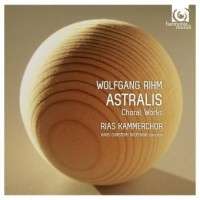|
Back
06/13/2012
Wolfgang Rihm: Sieben Passions-Texte – Astralis ("Über die Linie" III) – Fragmenta passionis
RIAS Kammerchor, Hans-Christoph Rademann (conductor)
Recorded at Jesus-Christus-Kirche, Berlin (September-October 2011) – 68'07
Harmonia Mundi HMC 902129 –
Booklet in French, English, German

Expressive, perfectly balanced and annunciated choral singing marks this disc of magnificent choral works spanning German composer Wolfgang Rihm's career. The earliest work, Fragmenta passions presents the most challenging listening. Many choral techniques that may be familiar from the likes of Penderecki or Ligeti are present: glissandi, whispers and shouts, Sprechstimme and wildly exaggerated swoops. The intensity and imagination running through the work is presented. The tendency toward literal text painting is never corny or merely effects-driven, instead always effective and possessing an audacious youthful daring. The second movement ("They all say unto him: 'Let him be crucified.'") presents a wild romp of slides and shouts, while the movement that follows ("Father, forgive theme: for they know not what they do.") is a moody, suspended setting. Pre-echoes of the chordal stacking of Eric Whitacre can be found here and there, but there is a devout sincerity in Rihm's use of these techniques, and he is more willing to suddenly change textures when the text dictates it. The confidence of this work, composed in 1968 (Rihm was 16 years old) is staggering.
Astralis, a 30-minute composition from 2001, sets a text by Novalis. Rihm initiates ethereal floating clouds of harmony in its opening representation of creation, and the slow, deliberate pace of the work shows a master craftsman able to sustain tension with little change. The climactic passage of the work, piling on the dissonance and increasing the volume, is arresting, as are the subtle colors that Rihm draws from his chosen instrumental accompanists, consisting of cello and two timpani, the former often floating vibrato-less above the texture, the latter rumbling thunder-like deep below.
Rihm's language in the most recent work, Sieben Passions-Texte, might rely a bit too often on the chord-stacking technique, but this is nicely tempered by an unabashed use of consonance. Perhaps this is the least "individual" of the works on the disc, but it is still engaging listening, especially in a performance as fine as this.
The RIAS Kammerchor has a lengthy, esteemed discography of the most challenging twentieth-century choral works, and the quality of singing on this disc certainly comes as no surprise. Hans-Christoph Rademann finds expression in each work, and his ability to sustain tempo and coax amazing tiered dynamic waxing and waning in Astralis is particularly impressive. Listeners seeking choral works with a bit more "grit" than the typical fare will find plenty to relish here. The booklet essay is excellent, detailing origins of the works as well as accurately describing mood and techniques. Full texts of each work are include in all three languages. This is an intriguing disc for those looking to expand their choral library.
Marcus Karl Maroney
|